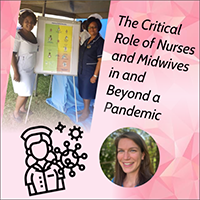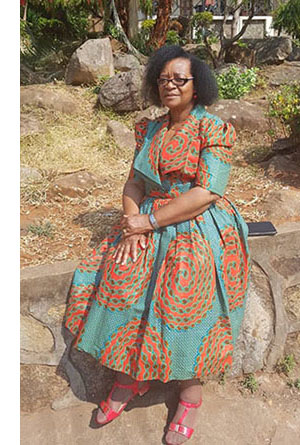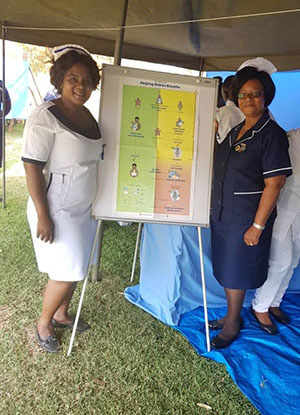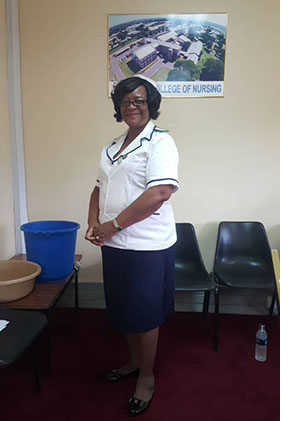The Critical Role of Nurses and Midwives In and Beyond a Pandemic: Reflecting on 2020 with Ann Phoya, Doctorat, RNM

![]()
In honor of the 200th anniversary of Florence Nightingale’s birth, the World Health Organization designated 2020 as the International Year of the Nurse and the Midwife. The objective of this cause, which is aimed at recognising and celebrating 59% of the world’s health professionals, took on a new dimension as the COVID-19 pandemic has taken over 2020. The president of the Association of Malawian Midwives, Ann Phoya, PhD RNM, reflects on the role of nurses and midwives in her home country and what that means as the world moves towards the achievement of the Sustainable Development Goals in 2030. She is currently working at Management Sciences for Health as the Deputy Director of the USAID ONSE Health Activity. This interview has been edited for length and clarity.
According to the WHO, the total number of nursing graduates would need to increase by 8% per year globally, in order to meet demand. Given the need to accelerate nursing education, what investments do you think need to be made?
 We must begin with the appropriate infrastructure. There needs to be adequate classroom space, especially for physical distancing during COVID. Schools also need to invest in skills labs. Midwifery is a practical issue; you can cover the theory, but you need to go and practice. You need to go to the skill lab before you go to the labor ward.
We must begin with the appropriate infrastructure. There needs to be adequate classroom space, especially for physical distancing during COVID. Schools also need to invest in skills labs. Midwifery is a practical issue; you can cover the theory, but you need to go and practice. You need to go to the skill lab before you go to the labor ward.
Faculty also need to be up to speed with their skills. It is easy for faculty to lose their clinical competencies when they are overwhelmed and have so many students. They do not have enough time to go to the clinic and translate what they teach into practice. En plus, due to staff shortages, it is common for students to be seen as an extra pair of hands in the clinic and then they are not able to concentrate on their education.
How do you think the COVID-19 pandemic will impact the nursing profession, particularly as it relates to education and workforce development?
The pandemic has affected all aspects of the health sector. For Malawi students in health professions, schools closing will push back this year’s graduation until next year. En outre, there will be a backlog of students looking to enroll in these programs.
Workforce development is another issue. In Malawi, many health professionals are unemployed. The IMF has encouraged limiting the size of civil service in the country, and most health workers work in the public sector. The government knows that more health workers are needed, but they are unable to get the necessary funding. We need to continue lobbying for an increase in the health budget nationally, and for donor-funded projects, request that a certain percentage of funds are used to address issues in human resources. This could include supporting nursing schools or providing funds specifically for the Ministry of Health to employ more health workers.
As countries around the world wrestle with the COVID-19 pandemic, what do you think is the best possible outcome for nurses, midwives, and the health systems in which they work?
 Health systems need to come up with recovery programs in order to address the gains that have been lost during COVID. Antenatal clinic visits, family planning uptake, and pediatric immunizations have all decreased during the pandemic. We cannot afford to have a measles outbreak; we need to make sure we come back aggressively. There has also been a rise in teenage pregnancies and marriages while schools have been closed. This is a contributing factor to maternal mortality, and we need to ensure that these girls are getting antenatal care, which nurses and midwives can provide. En outre, we need to be assured that midwives are there to welcome them, not be judgmental, and provide respectful maternity care for all mothers, including teenagers.
Health systems need to come up with recovery programs in order to address the gains that have been lost during COVID. Antenatal clinic visits, family planning uptake, and pediatric immunizations have all decreased during the pandemic. We cannot afford to have a measles outbreak; we need to make sure we come back aggressively. There has also been a rise in teenage pregnancies and marriages while schools have been closed. This is a contributing factor to maternal mortality, and we need to ensure that these girls are getting antenatal care, which nurses and midwives can provide. En outre, we need to be assured that midwives are there to welcome them, not be judgmental, and provide respectful maternity care for all mothers, including teenagers.
We need to recognize that nurses and midwives have been working under stress and fear. Psychosocial support needs to be part of the package for health workers, along with resources such as PPE and support for staffing levels. The issue of burnout isn’t imaginary; it’s real.
 As we look forward to 2021, what do you think is the most important action item for governments and stakeholders looking to advocate for and advance the role of nurses and midwives?
As we look forward to 2021, what do you think is the most important action item for governments and stakeholders looking to advocate for and advance the role of nurses and midwives?
2020 à 2030 needs to be the Decade of the Nurse and Midwife! Dans l'année 2030, we’ll take stock of our progress on the Sustainable Development Goals and we cannot achieve them without nurses and midwives. Especially for Sustainable Development Goal 3, we need to make certain that nurses and midwives are given the appropriate resources to do their jobs. This means more than just having functional equipment, running water, and electricity in health facilities. We also need to support professional development and ensure that there is an improved availability and distribution of human resources, particularly in rural areas.
A PROPOS DE L'AUTEUR
 Mallory Michalak is a public health social worker based in Lilongwe, Malawi. She currently works at CDC Malawi as a PHI/CDC Global Health Program Management Fellow where she supports HIV prevention, care, and treatment programs. She holds a Master of Social Work and a Master of Public Health from University of North Carolina and has worked in maternal, child, and reproductive health in Malawi, Papouasie Nouvelle-Guinée, Uruguay, and the United States. The views expressed here belong to the author and do not reflect the official position of any other organization.
Mallory Michalak is a public health social worker based in Lilongwe, Malawi. She currently works at CDC Malawi as a PHI/CDC Global Health Program Management Fellow where she supports HIV prevention, care, and treatment programs. She holds a Master of Social Work and a Master of Public Health from University of North Carolina and has worked in maternal, child, and reproductive health in Malawi, Papouasie Nouvelle-Guinée, Uruguay, and the United States. The views expressed here belong to the author and do not reflect the official position of any other organization.




Réponses